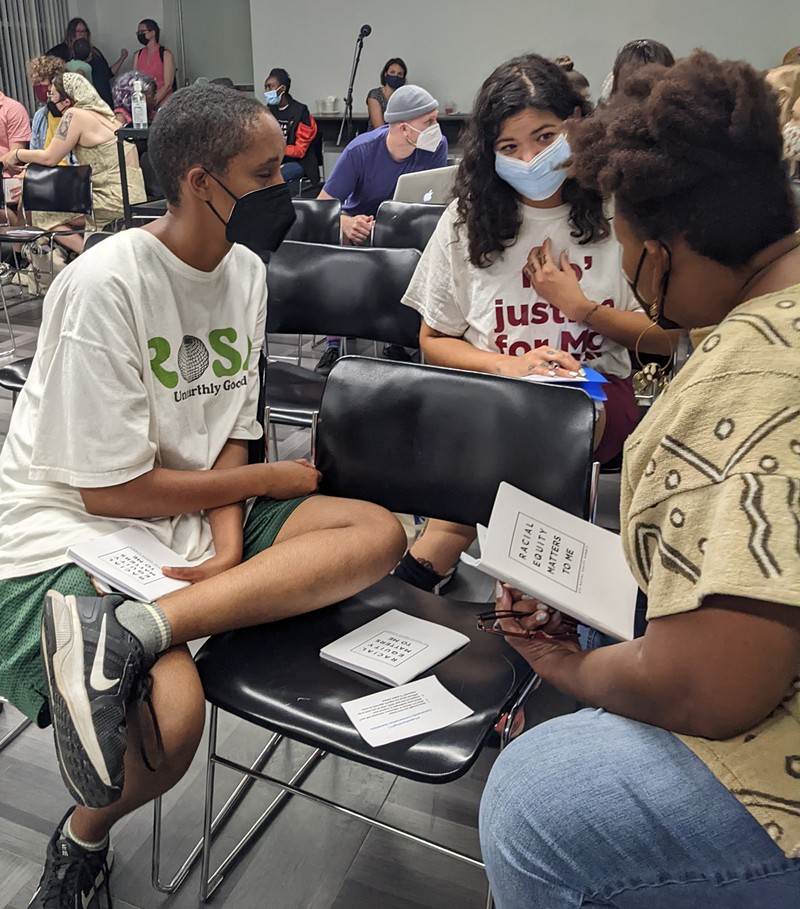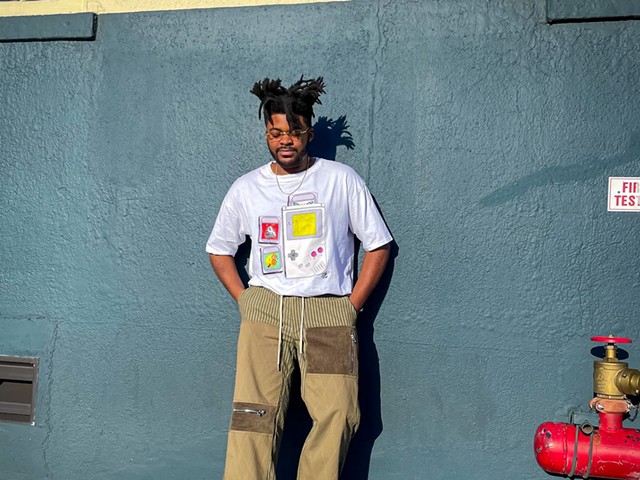
VIA FORWARD THROUGH FERGUSON
About 35 people visited the Thomas Dunn Learning Center in Dutchtown for a community dialogue about the St. Louis 911 system.
Before talking about St. Louis’ 911 system, Jia Lian Yang took a temperature check of the crowd.
“One sound that expresses how you feel, on the count of three,” Yang said. “1-2-3.”
Everyone in the room, as one, let out a sigh. A groan. They had come to talk about the 911 system in St. Louis. And that solicited a groan.
On Friday evening, nearly 35 people packed into the Dutchtown Thomas Dunn Learning Center to participate in a community dialogue organized by Forward Through Ferguson in partnership with Humans of St. Louis.
The event stemmed from #Transforming911, an initiative that aims to reimagine the 911 system, says Yang, the director of storytelling and communications for Forward Through Ferguson. The current system, residents expressed on Friday, isn’t working. Dispatchers are overworked and understaffed. Residents wait on hold for 10, 15, 20 minutes in dire situations. Armed police officers respond to nearly every and any event — regardless of the need.
“What we know from St. Louisans’ 911 stories is that our 911 system is not providing the level of safety and security that St. Louisans deserve,” Yang tells the RFT.
At Friday’s event, people shared their 911 stories. One lifelong St. Louisan, Patrice Hill, said someone recently stole her mother-in-law’s Kia car. She phoned the police around 1 p.m., but they didn’t arrive until 6 p.m.
Another person, who identified herself as a worker for a bullet-related injury clinic, said her daughter was shot and killed and bled out in the street because the ambulance didn’t arrive in time.
“It's a matter of life and death,” Yang said after the event. “People do not call 911 for fun. … People call 911 on some of their worst days.”
Forward Through Ferguson was founded as a response to the Ferguson Commission Report released after the death of Michael Brown in 2014. The report listed 189 calls to action, Yang says, and one of those was improving the 911 system.
To fix anything else, though, you have to start with the 911 system, Yang says. “911 is the front door to the public safety system,” she explains. “Our thought is if we really believe in reimagining public safety, you really can't do that if you don't address 911.”
To do so, Forward Through Ferguson created the #Transforming911 project, an ongoing exploration of the 911 system, with a full report set to be published in late 2022. Over the years, it has compiled research, data and stories to better understand the 911 system — why people call 911, how 911 responds and how 911 can improve, such as adding non-police civilian first responders.
Forward Through Ferguson partnered with AH Datalytics, for example, which looked at over 1.7 million 911 calls made to the St. Louis County police between 2015 and 2020. They found that people call “mostly for service and medical reasons,” says Yang. “… It really debunks the myth that when people call 911, it's for this very scary, violent situation that requires use of force.”
As part of the #Transforming911 project, Forward Through Ferguson planned three community events in Midtown, Dutchtown and Ferguson. The events are designed to share research, inform the public and hear from the community.
“Being able to hear from community residents, what they want in terms of our public safety system, what they want from our 911 system and the questions that they have about the 911 system, is really important,” she says. The goal, Yang adds, is to “give them a sense that, within community, we can move forward.”
On Friday, attendees explored a Humans of St. Louis exhibit focused on 911, watched a presentation, spoke in small groups and spoke in a large group. They also listened to a Q&A with a dispatcher to learn more about the various sides of the 911 system.

VIA FORWARD THROUGH FERGUSON
Audience members break out into small groups during the #Transforming911 event.
Wearing a blue police dispatcher’s shirt, Erricka Moorehead identified herself as a mother of two, a lifelong St. Louisan and a dispatcher for the city for six years.
“I love the city of St. Louis,” she said. “I love our citizens. I love the struggles because I want to help people.”
Moorehead talked about her experience on the other side of the call — how dispatchers prioritize incidents and how the job is structured. She said their goal isn’t to make people wait for extended periods of time. The dispatchers are just severely understaffed. Moorehead, for example, occasionally works 16-hour shifts.
“Think about it,” she said, “there's only two call-takers at times.” The crowd gasped.
But Yang wouldn’t classify the night as negative. There were a few teary eyes and a few collective deep-breath exercises. It’s a serious subject matter, she says. But she called it a "positive" event — one where people listened to each other, learned from each other and tried to find some solutions together.
“You see the sense of relief from people," she says, "that they're able to find other community residents who share their same values, who share their same questions, who are willing to figure out a path forward together.”





